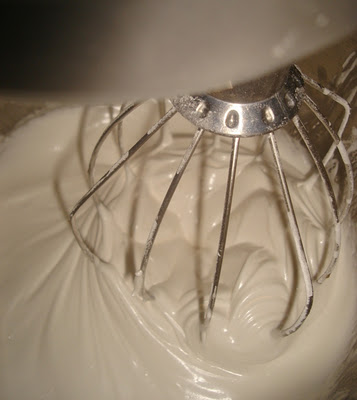Meringue Cookies
After being in the grip of an intense Southern California heatwave for the better part of a week, the hellish beast has released us from his gnarly fists into the kind of weather that Santa Monicans usually take for granted: a high of 71 degrees, 65% humidity, ultramarine skies that kiss the horizon of a glittering navy ocean with the mountains of Malibu in the distance. Sound dramatic? It is. That's how bad the heat was, people. It makes it tragically hard to bake, for one thing. Not that it stopped me. Anyway, with this recent return to the lovely weather that makes life worth living out here, I decided to celebrate by making meringue.
Meringue in all its forms has fascinated me for as long as I can remember. I grew up in a family of chocoholics, but occasionally, usually during the holidays, these delicious and unusual treats would appear among the goodies on my Gramma's kitchen table. Small and light in color, crisp sweet domes of I didn't know what, sometimes with tiny chocolate chips mixed in, sometimes flavored with peppermint. They were a sweet mystery, and I gobbled them up. I also remember begging for a towering slice of a lofty lemon meringue pie from a rotating case at a Greek restaurant, neglecting the shimmying yellow curd altogether and devouring only the sugary pillow on top. I had no idea that what I was in love with was called meringue, and would probably have abandoned it forever if I had been told what it was made of (my lifelong egg phobia is a thing of legend in my family--now it's mostly the yolks that freak me out, and just in certain circumstances. I'm all growed up!).
Meringue, in short, is egg whites whipped with sugar. How the whites and sugar are whipped together determines the kind of meringue it is and how it can be used. There's Swiss meringue, a "cooked" meringue, made by dissolving sugar in egg whites in a double boiler, then whipping them. Italian meringue is made by streaming hot sugar syrup into the whites while they are being whipped, and is also considered to be a cooked meringue. French (aka "classic") meringue, which I make most often, is uncooked, just egg whites and sugar whipped together (I take granulated sugar for a spin in my clean coffee grinder first for a smoother texture). The more sugar added to any meringue, the stiffer the end result will be. These meringues are the base for thousands of recipes, everything from buttercream frostings to the aforementioned lofty pie toppings, dessert shells, macaroons, macarons, and more. And let's not forget meringue cookies.
Because they are so neutral in flavor, meringue cookies can be flavored with just about any extract or powdered flavoring imaginable, and little jaunty bits of chocolate or nuts or somesuch can be nice too. But I like them in traditional vanilla (with the best extract, please), maybe with a bit of cocoa, with tea on a nice, breezy, sunny day like today. When I mentioned that it's perfect meringue cookie-making weather here in Santa Monica, that mainly has to do with the relatively low humidity. Making baked meringue in humid or wet weather is a guaranteed failure--the meringue will flatten and burn and generally just be very sad.
But not today! Today we make meringues.
Meringue Cookies
Makes about 20, depending on size
4 large egg whites, at room temperature
1/4 teaspoon cream of tartar
pinch of salt
3/4 teaspoon good vanilla extract
1 cup superfine sugar
Preheat oven to 225 degrees and set the rack to the lower-middle position. Line two cookie sheets with parchment paper.
In an immaculately clean metal or glass bowl (any trace of grease will ruin your efforts), begin whipping the egg whites in standing mixer fitted with the whip attachment, or with an electric mixer, on medium speed until foamy. Add the cream of tartar and the salt, and whip at high speed until the whites are voluminous, glossy and sexy-looking, with the look and consistency of shaving cream.
With the mixer running, begin raining in the sugar, taking a short break about halfway to insure the sugar is well incorporated. When all the sugar has been added, add the vanilla.
At this point, you can add other flavorings or accoutrements (like finely chopped nuts or chips) as well. I opted to make half the meringue cookies vanilla, and gently folded in a tablespoon of Valrhona cocoa to the remaining batter to make chocolate meringues. These added elements will make the whites deflate ever-so-slightly, but they will still be delicious.
Shape the batter into cookies by using two spoons, dropping them onto the parchment-lined cookie sheets. Bake at 225 for 1 1/2 hours, until the exteriors are firm and dry. If they begin to brown, turn the oven down to 200 degrees. Turn off the oven and let the meringues dry out overnight. These can be stored in an airtight container, but are best eaten ASAP, as they will start to become soft and tackier over time. But that's not all bad either, really.



